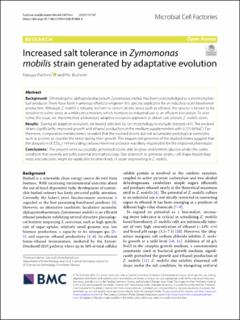Increased salt tolerance in Zymomonas mobilis strain generated by adaptative evolution
Peer reviewed, Journal article
Published version

Åpne
Permanent lenke
https://hdl.handle.net/11250/2687816Utgivelsesdato
2020Metadata
Vis full innførselSamlinger
Sammendrag
Background
Ethanologenic alphaproteobacterium Zymomonas mobilis has been acknowledged as a promising biofuel producer. There have been numerous efforts to engineer this species applicable for an industrial-scale bioethanol production. Although Z. mobilis is robustly resilient to certain abiotic stress such as ethanol, the species is known to be sensitive to saline stress at a mild concentration, which hampers its industrial use as an efficient biocatalyst. To overcome this issue, we implemented a laboratory adaptive evolution approach to obtain salt tolerant Z. mobilis strain.
Results
During an adaptive evolution, we biased selection by cell morphology to exclude stressed cells. The evolved strains significantly improved growth and ethanol production in the medium supplemented with 0.225 M NaCl. Furthermore, comparative metabolomics revealed that the evolved strains did not accumulate prototypical osmolytes, such as proline, to counter the stress during their growth. The sequenced genomes of the studied strains suggest that the disruption of ZZ6_1149 encoding carboxyl-terminal protease was likely responsible for the improved phenotype.
Conclusions
The present work successfully generated strains able to grow and ferment glucose under the saline condition that severely perturbs parental strain physiology. Our approach to generate strains, cell shape-based diagnosis and selection, might be applicable to other kinds of strain engineering in Z. mobilis.
